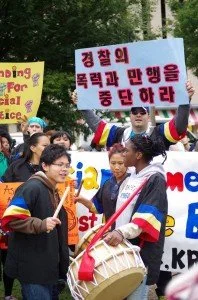Can we ______stand each other?
10-27-2014
By Eddie Rosa Fuentes
In early October, a delegation of McCormick students traveled to Ferguson, MO to take part of the weekend of action, #FergusonOctober. Eddie Rosa Fuentes, student and head of the Anti-Racism student group, reflects on his experience as part of the protest and how it will continue to inform his vocational journey.
I have been asked to write something about my experience in Ferguson. I hope that this will be more than a simple survey of what I experienced with other fellow students when we joined the Korean American Resource and Cultural Center (KRCC) and other Non-profit organizations like Black Youth Project, the Workers Center for Racial Justice, Chicago Workers Collaborative and others to protest against police brutality and racism in St. Louis and Ferguson, MO.
To analyze all that happen in this demonstration in a small article is, definitely, impossible. Nevertheless, it is important to say several things and reflect deeper about it. I will focus on one particular event, which is the first march that we did on Saint Louis, MO and I will talk about it from who I am: a Latino guy with the “privilege” of living in the United States of America and born with US citizenship.
Tyler Orem, Mary Kathryn Dean and I traveled with McCormick’s alumna Nayoung Ha and alumnus MinWon Song and their daughter from KRCC on Friday, October 10th and on Saturday we did the first demonstration, a march in downtown St. Louis. On this march, people around the country gathered to protest against police brutality. The diversity, of the thousands of people that were there, was immense. You could see: African Americans, Africans, Latin@s, Latin@-Americans, Eastern Asians, Western Asians, Gays, Lesbians, Straight, Trans, Clergy members, Lay people, non religious, Muslims, Christians, Buddhists, and Jewish.
In the mist of chants in the English language, like “The people united, will never be defeated”, “Hands up, don’t shoot” or “Tell me how democracy looks like, this is how democracy looks like”, among other several protests chants; Latin@s, including myself, started chanting in Spanish. I can recall two of these chants. The first one was “El pueblo unido, jamás será vencido” (a translation for “the people united…”) and the other one was “La migra, la policía; la misma porquería” (The Inmigration and Customs Enforcement [ICE] and the police are the same crap).
The New York Time in 2013 said that in 2012 “There were 463 deaths in the past fiscal year, which ended Sept. 30th — the equivalent of about five migrants dying every four days, according to an analysis by the Washington Office on Latin America, a human rights group.” It is true that not all of this deaths is are related to ICE, nevertheless a study made by the Binational Migration Institute in the University of Arizona named: “A Continued Humanitarian Crisis at the Border: Undocumented Border Crosser Deaths Recorded by the Pima County Office of the Medical Examiner, 1990-2012” revealed that militarizing the frontier cause higher death rates.
Some people might ask, why am I talking about Latin@s and migration issues when I started with Ferguson? I think the answer is simple, however, not simplistic: Violence is interconnected. The “white supremacy system” has convinced us that Ferguson is an African-American issue and that Migration is a “Mexican” issue (ignoring the broader Latin@ world) and that these are disconnected issues. This system is the responsible for the separation of Latin@s and African-Americans and for making them to fight each other. In a sense, asking between themselves who have had the worst experience of violence. In other words, this system raped and outraged these communities, and it is still doing it. That is to say that the violence inflicted upon the African American community affect the Latin@ community and the violence inflicted upon to the Latin@ community affect, directly and indirectly, the African American community.
As brothers and sisters from different communities but with similar experience of being the oppressed by the “white supremacy system”, which give privilege to some group and despise other because their color of their skin and ethnicity, we need to join together to dismantle and break, not white communities, but the system that privilege them. As a Latino, I envision my community crossing borders of race, class, gender and any other social construct created to keep us divided. Together we have the strength to dismantle all oppression and all violence inflicted upon us. Together we can lean, as a community to each other, and help us continue the struggle against white supremacy. Together we can shout out in “United we stand; divided we fall” or like we say in Puerto Rico we say “EN LA UNIÓN ESTÁ LA FUERZA.”
Eddie Rosa Fuentes is a middler student, the moderator of the Anti-Racism student group, and works for the Center for Latin@ Studies at McCormick Theological Seminary.
Eddie Rosa Fuentes holds up a sign in the #FergusonOctober protests.
Protestors came from many different backgrounds
Protestors dyed the fountain in front of the capital building red to protest police brutality





